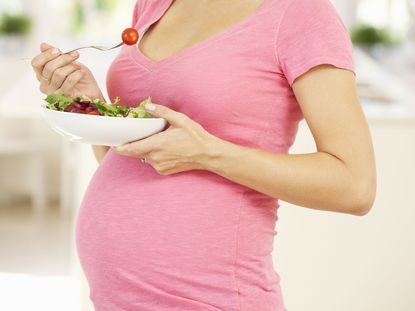Eating During Labour Now Thought To Be Beneficial To Mother And Child
New research suggests fasting in labour could be doing more harm than good for some women

New research suggests fasting in labour could be doing more harm than good for some women
Eating during labour is now thought to be beneficial for mother and child, according to new research.
For years women have been told that consuming anything in the delivery room could potentially harm them and their baby, but new findings now challenge this belief.
Doctors have long thought that whilst under general anaesthetic, a woman in labour risks inhaling the food into her lungs. Its a condition known as 'aspiration' which can potentially lead to pneumonia. But Canadian medical professionals have presented new information to the American Society of Anesthesiologists - information that now suggests this condition is now highly unlikely due to developments in anesthesia care.
Researchers argue that the widespread use of epidurals and spinal blocks, coupled with the declining prevalence of the nose and mouth anaesthetic in the delivery room, means that the risk of aspiration is considerably lower than it was before.
Doctors at Memorial University in St. John’s, Newfoundland, reviewed 385 studies since 1990 and have concluded that forgoing food and liquids during labour may be unnecessary for women. In fact, researchers argue that the physical demands of giving birth may actually require a light meal to replenish energy lost for women - which is akin to running a marathon.
As many women can attest, labour is laborious and consuming nothing but water for several hours can exacerbate the difficulties of such an intense experience. Medical professionals involved in the study noted that fasting throughout labour increases the acidity of the blood in both Mother and child - which can reduce contractions, leading to longer and more painful labour and increased risk to newborn health.
Marie Claire Newsletter
Celebrity news, beauty, fashion advice, and fascinating features, delivered straight to your inbox!
Additionally, the research suggested that going without food during labour can cause female emotional stress, possibly leading to a decreased level of blood in the uterus and placenta - again, increasing labour time.
Co-author of the study, Christopher Harty, said: ‘anesthesiologists and obstetricians should work together to assess each patient individually. Those they determine are at low risk for aspiration can likely eat a light meal during labor. This gives expectant mothers more choices in their birthing experience and prevents them from being calorie-deficient, helping to provide energy during labour.’
However, each woman should be assessed individually, medical professionals suggest, before bringing snacks or food into the delivery room. Furthermore, this research has only been presented at medical meetings and some doctors have warned that this research should not be properly considered until published in a peer-reviewed journal.
The leading destination for fashion, beauty, shopping and finger-on-the-pulse views on the latest issues. Marie Claire's travel content helps you delight in discovering new destinations around the globe, offering a unique – and sometimes unchartered – travel experience. From new hotel openings to the destinations tipped to take over our travel calendars, this iconic name has it covered.
-
 Here's what I'm buying from the Victoria Beckham X Mango collection
Here's what I'm buying from the Victoria Beckham X Mango collectionWear it like Beckham
By Penny Goldstone
-
 Here's what you need to see at Venice Biennale 2024
Here's what you need to see at Venice Biennale 2024By Francesca Gavin
-
 Everyone raves about the cult Elemis cleansing balm, but it's this underrated cleanser that I swear by for oily skin
Everyone raves about the cult Elemis cleansing balm, but it's this underrated cleanser that I swear by for oily skinIt leaves skin bright, clear and smooth
By Mica Ricketts